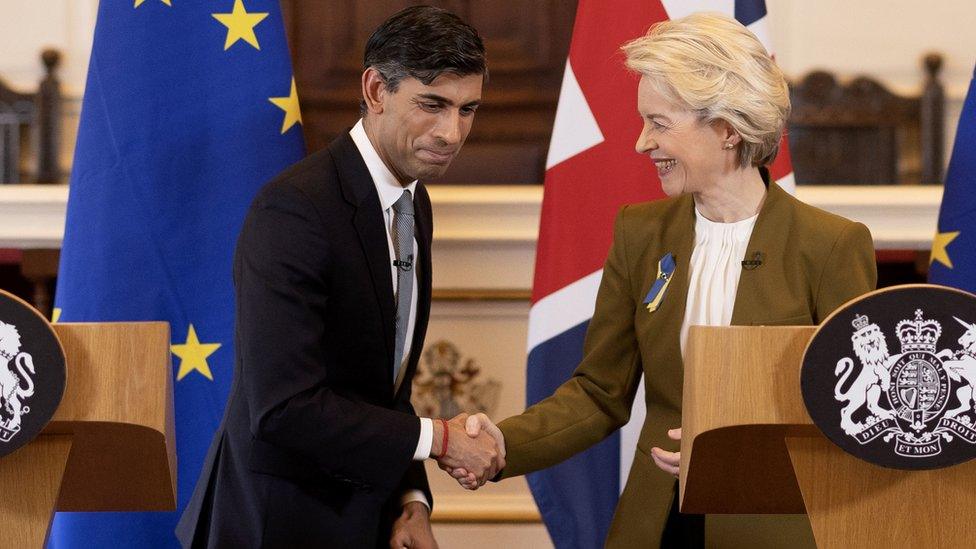Sir Jeffrey Donaldson: DUP leader faces down critics after threats
- Published
Sir Jeffrey was speaking as the Commons debated a bill to extend the deadline for restoring devolution
Sir Jeffrey Donaldson has said he will not be "deflected" after revealing he was threatened over his efforts to reach a deal to restore Stormont.
The Democratic Unionist Party (DUP) leader said one of those behind the threats "didn't even vote at the last election".
He was speaking as the Commons debated a bill to extend the deadline for restoring devolution to 8 February.
The Stormont executive has not met for 23 months because of a DUP protest.
It has also blocked the functioning of the Northern Ireland Assembly as it seeks changes to post-Brexit trade rules.
"A unionism that turns in on itself is not the way to go," he told MPs on Wednesday.
"I was threatened by those who never put on a uniform, by those who haven't served our country and when I checked out one of the people who threatened me, they weren't even on the register.
"They didn't vote at the last election," he told the Commons.
"They can't even come out to vote for our future in the union. Yet they're threatening people like me who are working day and night to find solutions."
BBC News NI asked the Police Service of Northern Ireland (PSNI) if anyone had been questioned over the threats made against Sir Jeffrey but a spokesman said the PSNI does not discuss the security of individuals.
Stormont stalemate
The move to legislate for an extension is aimed at giving the DUP more time to decide whether to return to power-sharing.
There have been suggestions that progress has been made between the government and the DUP on the post-Brexit rules, however, there remains no deal.
The Northern Ireland Executive Formation Bill, external passed through both the House of Commons and the House of Lords on Wednesday, after being fast-tracked.
The government is hoping the bill will receive Royal Assent by the end of the week.
If there is still no executive, Northern Ireland Secretary Chris Heaton-Harris will be under a legal duty to call an election, but it is understood he may instead put new governance arrangements in place including a greater role for London.
'Wait to cast verdict'
In a lengthy speech, the DUP leader - whose party is facing pressure to return to Stormont - said he would "continue on course" and work to reach a decision and that "further changes" would come as a result of his party's actions.
He also directed criticism at his unionist rivals in the Traditional Unionist Voice (TUV).
"What has the TUV delivered by way of change to the protocol - not a single thing," he said.
The TUV leader, Jim Allister, said that his party had "no apology" to make for keeping focus on the "dire constitutional consequences of the union-dismantling protocol".
He said if the DUP "backslides into becoming protocol implementers" his party would "not hesitate to act".
"Our mission is to ensure they don't, but if they do, then we will not be deterred from continuing to tell the truth about the iniquitous protocol," he added.
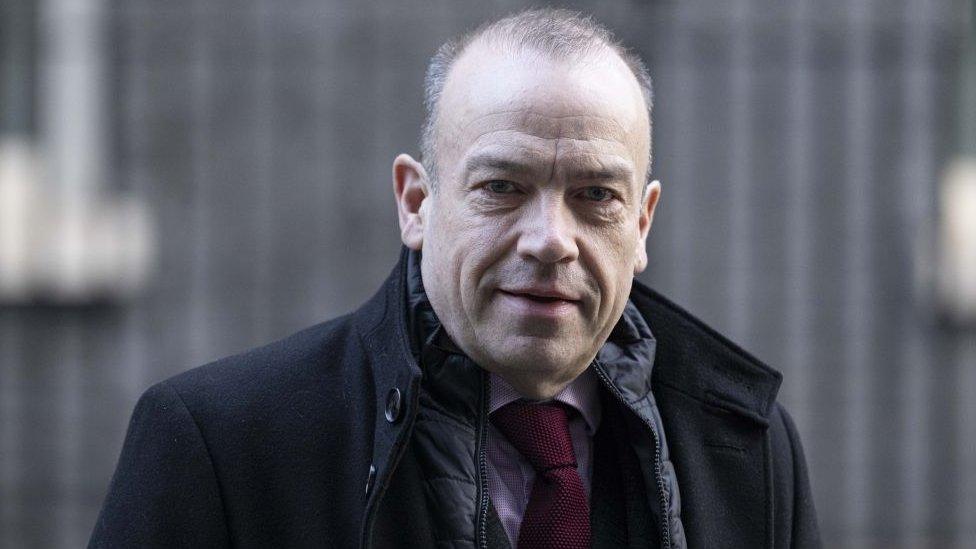
NI Secretary Chris Heaton-Harris may have to legislate for light-touch direct rule if Stormont does not return
Sir Jeffrey told the Commons that others were attempting to "orchestrate opposition to a deal that has not yet taken place".
"The fact we're sat here today in the Commons extending legislation reflects the reality that no agreement has yet been reached," he continued.
"There are some who, for their own narrow purposes, are putting it about that certain things have been agreed and they know it's there.
"But I say this - wait until an agreement is reached before you make your final verdict."
'Disgraceful threat'
Sir Jeffrey added that there was a "tiny minority" of people who did not want Stormont back and would prefer "imperfect direct rule than an imperfect Stormont".
SDLP leader Colum Eastwood said those who threatened Sir Jeffrey "couldn't lace his boots".
"We are in a more hopeful place than we have been - if this today symbolises we are getting closer to a resolution we have to welcome it and give it space."
Alliance MP Stephen Farry said he found Sir Jeffrey's words in relation to a return of power sharing "encouraging".
And he said if the DUP returns to the executive that will be a "smoother way" of releasing money to resolve public pay sector disputes than putting pressure on the government to step in.
Mr Heaton-Harris also thanked Sir Jeffrey for his speech and condemned those who had threatened him.
"The fact he's been threatened for doing what he has been doing is a disgrace," he said.
He added that he hoped politicians would soon be back "celebrating" the return of power-sharing.
Shadow Northern Ireland Secretary Hillary Benn said it appeared talks between the DUP and the government had arrived at a "moment of decision".
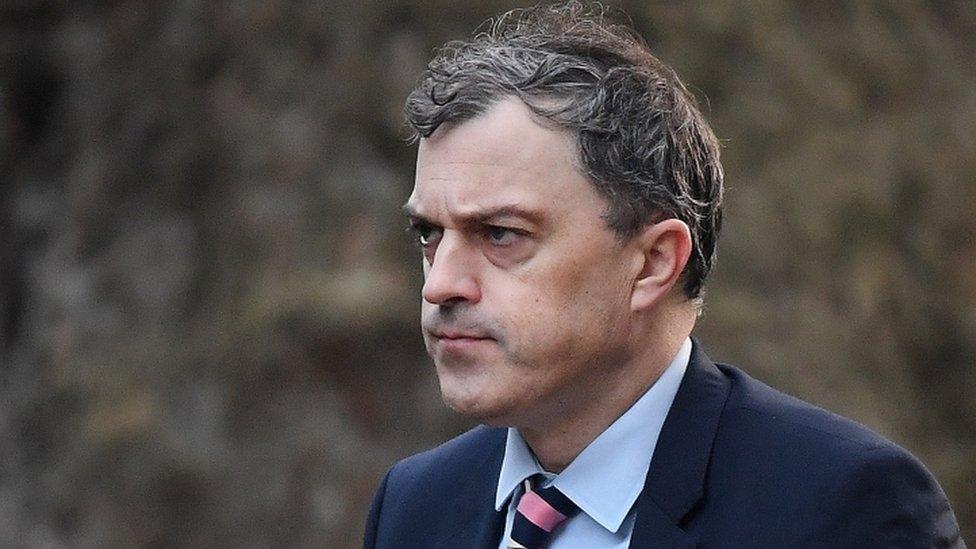
Julian Smith was Northern Ireland secretary during the New Decade, New Approach talks
Earlier, Julian Smith - who served as Northern Ireland secretary from 2019 until 2020 - said devolution was the "key route" for making the case for the union.
He added that the DUP "seem to have negotiated a very good deal on issues around the Windsor Framework".
The debate comes after a major strike in Northern Ireland last week by tens of thousands of public sector workers about pay rises.
Mr Heaton-Harris said the funding offer to Northern Ireland's parties for a restored executive would allow money to fund this.
- Published23 January 2024
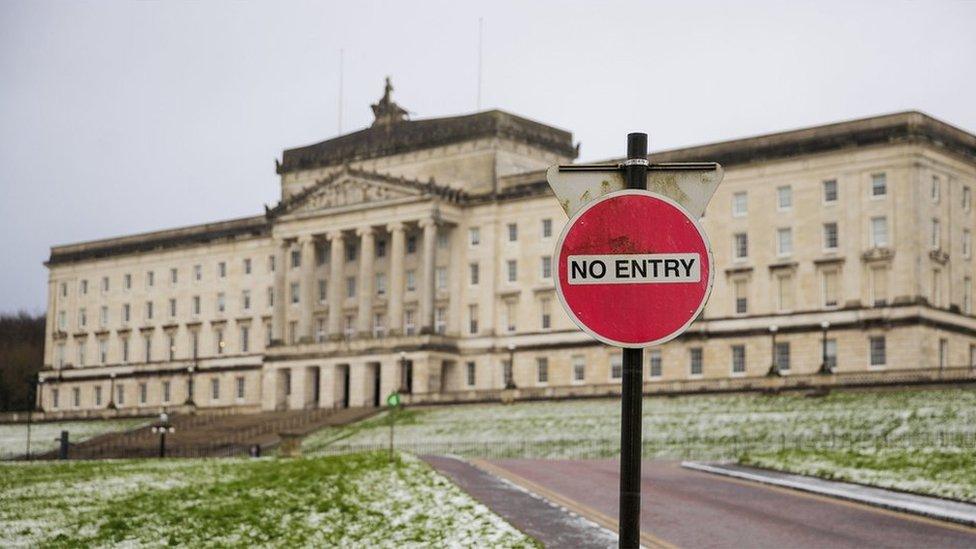
- Published22 January 2024
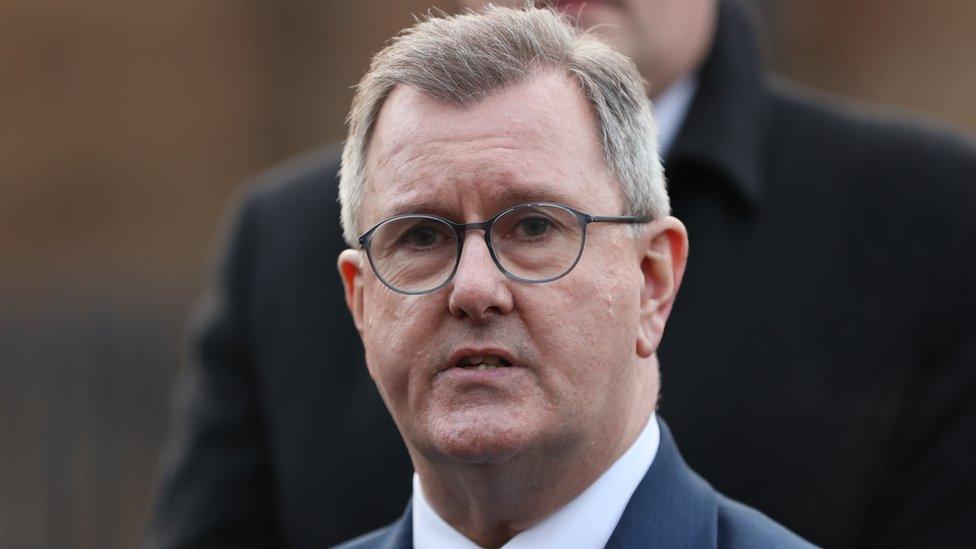
- Published1 October 2023
